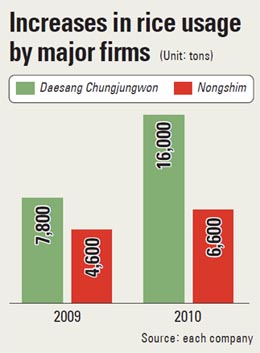
Market Information > 한국 농식품 시장뉴스
한국 농식품 시장뉴스
January 27, 2011
2011.01.27
For Coverage: January 25 - 27, 2011
European parliament passes trade safeguard act for EU-Korea FTA [English, CSY]
http://english.yonhapnews.co.kr/national/2011/01/26/73/03010
Summary: The European Parliament's trade committee passed an enactment bill that outlines the use of trade safeguards once a free trade agreement (FTA) with
S. Korea,
http://english.yonhapnews.co.kr/business/2011/01/26/050
Summary: South Korea and the U.S. will soon conclude work on the final text of their recently concluded free trade agreement (FTA), paving the way for the pact to be ratified in both countries, a high-ranking trade official said Wednesday. In December last year, both countries reached a final agreement focusing on
Wheat is out as more food companies turn to rice [English, CSY]
http://joongangdaily.joins.com/article/view.asp?aid=2931474

FMD holiday precautions out
Critics say crisis control manual was outdated and not aggressive [English, CSY]
http://joongangdaily.joins.com/article/view.asp?aid=2931542
Summary: Before en masse travel begins for the Lunar New Year holidays that start on Feb. 2, the government has appealed to the public to help fight foot-and-mouth disease (FMD). Meanwhile, critics are blaming the government’s FMD control methods for causing the nationwide spread of the disease. In the current manual, livestock within a 500-meter radius of infected farms should be slaughtered, with a transport ban and detergent washing of vehicles within a 10 kilometer radius. Although the disease has an incubation period of two weeks at maximum, there were no measures to consider regions with high possibility of infection, critics say. An epidemiologic investigation should have been launched to carefully determine the exact infection route, but the government failed to do so since there was no record of vehicles or people passing through areas, experts say. Vaccinations were also carried out according to the manual, and they were not aggressive, giving the disease opportunities to slip by, they observed. Lee Sang-gil, head of the food industry policy department at the Agriculture Ministry said they will “come up with a new manual so that this kind of case isn’t repeat.”
Pork tariff is set aside until June. Move to curb rising prices from FMD [English, CSY]
http://joongangdaily.joins.com/article/view.asp?aid=2931482
Summary:
The information in this report was compiled by the Agricultural Trade Office (ATO) at the U.S. Embassy in Seoul, South Korea. The press summaries contained herein do NOT reflect USDA, the U.S. Embassy, or other U.S. government agency official policy or view point. U.S. food exporters can learn more about market opportunities in South Korea by reviewing ATO Seoul’s Exporter Guide and other reports available at www.fas.usda.gov by clicking on “attaché reports”.
Agricultural Trade Office, U.S. Embassy - Seoul
Tel: 82-2-6951-6848 Fax: 82-2-720-7921
Email: atoseoul@state.gov